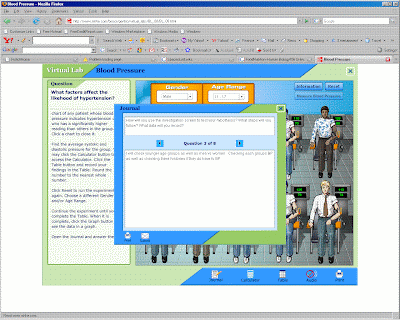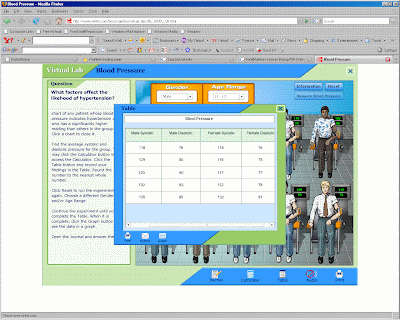This lab is about metabolic rates and what affects it and why. I will be checking my pulse, respirations, and blood pressure while doing three activities after establishing a baseline. The three activities will be at rest (just after waking up), walking (around the neighborhood), and cycling (up and down our hill).
With more work being done by the body the circulatory system will have to supply nutrients and oxygen to do the work (or play). The heart rate (pulse) will need to increase to supply more blood to muscles. Respirations will as increase as the workload increases also to meet the demand for oxygen. Blood pressure should stay somewhat level as the pressure should not go up at the same rate or anyone who exercises would stroke out or have a heart attack. Now on conduct the experiment and log the results.
Materials for taking my BP and a calculator for computing the mean values.
 Getting my baseline blood pressure.
Getting my baseline blood pressure.

I think I can............
METABOLIC RATE DATA TABLE
| | Repetition 1 | Rep 2 | Rep 3 | Rep 4 | Rep 5 | Mean |
| Baseline | | | | | | |
| Pulse | 64 | 65 | 63 | 64 | 65 | 64 |
| Resp | 16 | 15 | 14 | 15 | 16 | 15 |
| Systolic | 148 | 148 | 146 | 146 | 148 | 147 |
| Diastolic | 80 | 80 | 78 | 78 | 80 | 79 |
| Activity 1 | Waking up | | | | | |
| Pulse | 56 | 54 | 56 | | | 55 |
| Resp | 12 | 10 | 12 | | | 11 |
| Systolic | 142 | 140 | 142 | | | 141 |
| Diastolic | 76 | 74 | 76 | | | 75 |
| Activity 2 | Walking | | | | | |
| Pulse | 80 | 84 | 84 | | | 83 |
| Resp | 16 | 18 | 16 | | | 17 |
| Systolic | 146 | 148 | 146 | | | 147 |
| Diastolic | 80 | 80 | 82 | | | 81 |
| Activity 3 | Cycling | | | | | |
| Pulse | 146 | 160 | 154 | | | 153 |
| Resp | 36 | 38 | 36 | | | 37 |
| Systolic | 152 | 154 | 150 | | | 152 |
| Diastolic | 76 | 82 | 78 | | | 77 |


Based on the data gathered and logged in the table above, my original hypothesis is correct. As the workload for the body increased so to did my pulse and respirations, and the blood pressure stayed relatively flat overall. I do not feel there are any inaccuracies in the data above and that my hypothesis stands.
In conclusion the bodies circulatory system is very efficient in meeting the demand for more oxygen and nutrients to do the work or play that the body needs to do.
This experiment has actually confirmed what I had already had known from cycling many, many miles. But it was fun doing and comparing different activities to prove beyond a doubt about just how our body and specifically the circulatory system reacts to a workload placed on it. I believe I have met the criteria for a B-B+ based on the requirements below:
- Write-up includes all the sections in the presentation format
- Data are complete and means are correctly calculated
- Graphs show comparison for all metabolic measurements
- Analysis related what is shown in graphs back to hypothesis
- Correct units for all measurements are always indicated
- Introduction, Analysis and Conclusion show that student can put the data analysis back into the context of the circulatory system and the body’s cells need for oxygen.
Nutrition lab

-How healthy a daily diet do you think this is? Its just ok. Why? It definitely could be better balanced, as in more vegetables.
-What would you change about this day's eating, if anything? More vegetables!
-Do you find this kind of nutritional tracking helpful? Yes, I never really thought to track everything I ate, it would even more interesting to track a week or even a month.
Why or why not? It would truly give me an opportunity to really get a handle on what I eat and use it for training.
Blood Pressure Lab











No comments:
Post a Comment